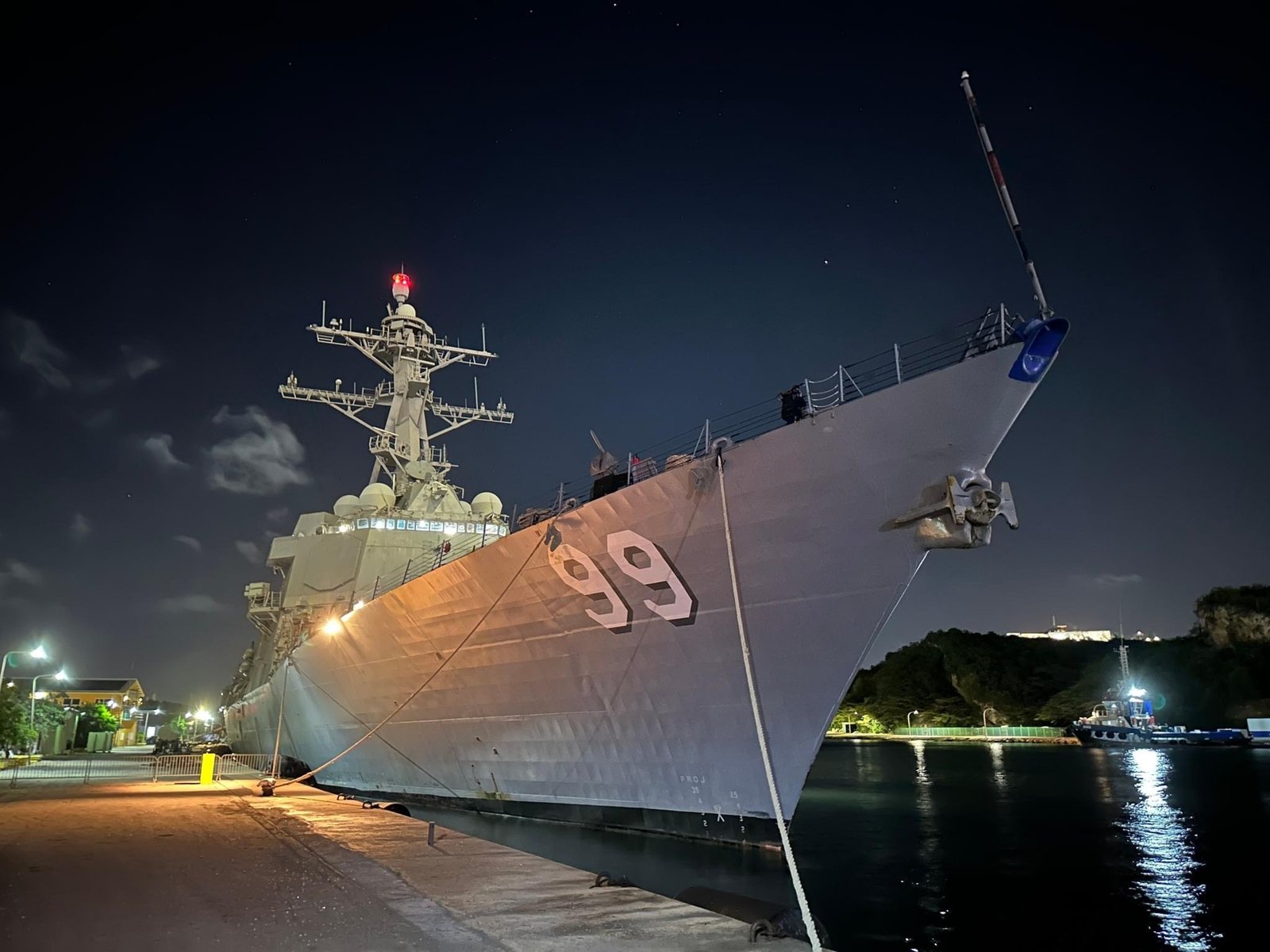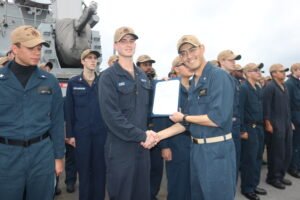
Cody Dodd is a NASM-certified personal trainer and Navy Command Fitness Leader who uses his fitness expertise to write fitness content for The DoddFather. Cody has transformed his physique and confidence by understanding the principles of exercise and fitness.
It all started with a radical fat loss of 55 pounds. From 225 to 170. From a kid who once couldn’t do a pull up, to knocking out 20 pullups in a Navy command competition while floating in the middle of the ocean.
He has a diverse writing and editing background that’s primarily focused on health and fitness, Navy life, and dad life. His work has been featured in Good Dads, as well as Platform Launchers, and Daddying.
Navy Deployment
Have you ever wondered what it’s like to experience a Navy deployment? Particularly as a first-time father?
This blog post will discuss the rollercoaster of emotions that sailors and their families face throughout the deployment. What it’s like to see great success at sea, to experience great distress back home. To hear about your child growing up rather than actively participate in it.
To be unable to help when your child is sick, or your wife is overwhelmed. To balance your duties onboard with your responsibility to maintain communication with your family.
Let’s go ahead and get into it.
Editorial Note: We earn a commission from partner links on The DoddFather. Commissions do not affect our editors’ opinions or evaluations. Learn more about our Editorial Process.
Pre-Deployment Preparation
Training and readiness requirements
You might expect a laid back work schedule in anticipation of departing on deployment for several months, but that is not the case in my experience. There is a lot of logistics and certifications required for your ship and crew to be ready for the deployment. Meeting firefighting readiness, anti-terrorism readiness, equipment readiness. Expect lots of late working days leading up to your deployment.
Legal and financial preparations
Everyone manages their finances differently. In my case, I handle most of the budgeting and finances for our family. It helps tremendously to set everything on auto-pay that you possibly can. To setup auto transfers between accounts to meet savings, investing, and giving goals.
This is all important, but arguably the most important factor is getting a will and power of attorney put in place. We all want to envision the future of returning home to our families after deployment. But you never know what might happen out there. Prepare for the worst, and set your family up for success.
Emotional and mental readiness
Doing everything in your power to be emotionally and mentally fit for deployment is vital. I don’t care what kind of ship you are on, or how long you are going to be gone. This is not going to be easy, and you are going to face challenges that you were not expecting. Prioritize your mental health. Take time to do things that you enjoy. Find ways to decompress and live in the moment. This moment is all we have, after all.
Life on Deployment
Daily routines and schedules
This is going to vary incredibly depending on your rate. What your job is, and what your pay grade you are. Also consider what type of vessel you are on. I am attached to a Destroyer(DDG). Everything is fast paced, and everyone has to carry their weight. I started out as an E3. Which meant I was doing all of the manual labor. I was the main “tasker”. I can only speak on my experience as an IT.
On deployment, we do shift work. Either two rotating 12 hour shifts, or three 8 hour shifts. In your off time, expect to be working on qualifications. This will require a lot of time and energy when you first get to your ship.
Challenges faced (isolation, homesickness, etc.)
When you first get to your ship, everything is new. It may feel like you’ll never adjust to this. Give it time and try your best to keep a good attitude. I am an introvert, isolation comes easy to me. But isolation is a detriment to your well-being on deployment. Be willing to talk to people. Realize that you are not the only person that may be struggling. Know who to keep it professional with, and find the ones that you can have real personable conversations with. You may find people that are just as homesick as you, if not more. Lean on those people and learn to build each other up.
Importance of camaraderie and support systems

Finding your people is incredibly important to a successful deployment. Finding the mentors within your organization. The people that can show you the way to excel as a sailor, and the ones that you can connect with on a personal level. There are always morale events going on. There is always church groups, Bible studies. The chaplain onboard offers religious services to accommodate for all religions. Your chaplain will also always be willing to sit down with you just to talk. That is immensely helpful out there.
Communication
Methods of communication with family and friends
I thank God to be living in this era. The means of communication while floating in a metal box in the middle of the sea is incredible. Now, there are hiccups with the communication methods. Services are intermittent sometimes. But a majority of the time it is available to you. There is outside phone lines, email, and even social media access. My preferred social media on a navy deployment is Facebook messenger. However you can, keep that communication with your family and friends alive.
Frequency of communication
This is something that you need to set the expectation for. I, thankfully, was able to talk to my wife almost every single day. But I made sure to set the expectation that there might be lapses in communication. And if there was, that I would do everything in my power to respond as soon as I was able.
You will encounter people who choose to communicate as little as once a week, or even less. These people like to lock in to their routine and stay focused. I’m all about getting into the groove of things, but I prioritize talking to my family. It is a main priority for me. You do what is best for you and your loved ones.
Dealing with communication challenges
The times when there are lapses of service you have two options. Sulk about it and worry endlessly about what’s going on back home, or take it for what it is and develop yourself professionally and personally. It’s not wrong to have that worry about if everything is okay back home. I choose to use that as fuel to go harder and make strides towards becoming better. You can also choose to default to older communication methods like writing a letter. Imagine that.
Responsibilities and Duties
Overview of typical tasks and responsibilities onboard
Expect to become a capable firefighter. Expect to become an expert line handler. Expect to become proficient at high dusting, sweeping, swabbing, even polishing brass. Field days are a regular occurrence. Which was always ironic to me. Field days used to be a fun event back in grade school and even middle school. A day spent on the field, filled with water activities, relay events, and competition. How did it turn into a challenge to see how clean we can make the ship? Just Navy things. Expect to perform the duties required of your specific job, along with all of the other things that pertain to ship readiness. Oh yeah, expect lots of mandatory trainings and regular berthing cleaners as well.
Importance of teamwork and collaboration
One team, one fight. You will hear it a lot. I get it, and I do think that it is vital to the command success. It just sucks when you get punished for something you had absolutely nothing to do with. But anyway, no one is a success by themselves. Being self made is a myth. Acknowledge the people that take time out of their day and their busy schedule to help you out and get you where you need to be. Pay this forward as soon as you get the opportunity. Each one teach one.
Health and Wellbeing
Physical fitness routines
This one was huge for me. I consider the gym my main form of therapy on deployment. The mental release. I could tune out everything else going on and focus on my training routine. Listen to music that I enjoy and push my physical limits. This was something that I could more or less control despite all of the un-controllables. It also plays in to staying physically prepared for whatever challenge that presents itself. If you stay ready, you don’t have to get ready.
Mental health support and resources
There are not a whole lot of resources for this onboard. But they try their best. You can always go talk to medical about your troubles, they can point you in the right direction. You can also talk to your leadership about mental health concerns. You might be surprised what someone has experienced and how they may be able to provide you a fresh dose of perspective. I would say your Chaplain is the best resource onboard for mental health support. Not only is everything discussed completely confidential, these individuals are highly trained to help people like you. That’s the whole purpose of their job.
Access to medical care onboard
On a Destroyer, the medical resources are limited. There are 300 plus people onboard and there is usually only a handful of medical personnel onboard. Along with very limited space. Medical personnel are capable of helping you with a lot of ailments or concerns. But there are some things you may face that will require you to be flown to a larger ship, be flown to a nearby port, or to wait until your next scheduled port visit. The thing is, your Independent Corspman has the resources to get you the care that you need, regardless of if that resource is there onboard with you or not. Respect the process and be gentle with your approach.
Returning Home
Transitioning back to civilian life
You have probably missed out on a whole lot. New music, new shows, personal emails, current events, family members graduating, friends marrying, the list goes on. It’s probably going to feel awkward when you first get back home. I know it did for me. Try not to focus so much on what has changed. Try to walk in the gratitude of getting to be back home and the privilege that it is. Try not to put too much on your plate at once. Catch back up on things a little bit at a time. Take the time to enjoy yourself.
Reconnecting with family and friends
We call this re-integration. The Navy does their best to prepare you for this reunification of you with your loved ones. They offer briefs to any and all who are interested. In my experience, the real challenge is with your significant other. Especially when you have children. They have probably gotten used to doing things on their own now. You entering back into the picture might feel like an overstepping of boundaries.
It’s hard to get your bearing back, set your pride aside and figure out how you can resume the role of husband and father. Don’t be afraid to ask questions. Don’t assume that the way you used to do that thing still works. I recommend trying to come back home with an open mind. If you’re lucky, you just might win First Kiss. You can see my First Kiss moment below.
Dealing with post-deployment challenges
The level of challenges faced after a navy deployment can vary greatly. It depends on what you were assigned to, what type of mission you were on, what your job is, what you were exposed to. I can’t speak to all of the challenges that a Sailor may face when returning home. Some of the things I battled was emotional distress, readjusting to routine, and relationship strain.
I spent so much time losing myself in a new routine while out at sea. I had to. It helped me cope with the struggle of being separated from my family. Unlearning that routine and trying to establish a new routine in my personal life took a lot of work. I got home 3 months ago, and I am still working it out.
Key Points
* Pre-Deployment Preparation*
*Life on Deployment*
*Communication*
*Responsibilities and Duties*
*Health and Well-Being*
*Returning Home*
Is it your turn?
If you find yourself gearing up for a navy deployment, take heart. It isn’t all bad. What you’re doing is an honorable thing. The sacrifice that you are making for your country right now will pay off. Manage your time well. Do everything in your power to come back a better version of yourself. Try to have fun. Commands usually do a good job of hosting morale activities and celebrating the holidays. I was Captain America for Halloween.

Common Questions
How long does a Navy deployment typically last?
A navy deployment is anything greater than 90 days. Typically I would say to expect 6 months. Sometimes it’s four, sometimes its nine, sometimes even longer. These deployment schedules can change at the drop of a hat too. It helps to stay flexible, and prepare for the worst. My longest deployment has been 5 months. I consider that a blessing.
What are some common challenges faced during navy deployment?
Lack of sleep. Lack of communication back home. Lack of motivation. Having little control over your dietary intake. You can only pack so many snacks and so many cans of tuna. At some point, you’re going to have to eat what the galley offers. I have had some great galley food, don’t get me wrong. But you’re not going to be able to count your macros accurately. If that’s your thing.
How often do navy sailors communicate with their families during deployment?
Dependent on a number of factors. I was able to communicate with my wife almost every single day. Facebook messenger, emails, the outside line phone on the ship, the times that we pulled into port and I was able to Facetime. The amount of technology we have at our fingertips is insane.
What is life like onboard a Navy ship during deployment?
It can get hectic. It might take you some time to find your sea legs. You have to get used to tight spaces. You have to get used to sleeping in a “rack” which in my case was like bunk beds stacked three high, and felt like a coffin. You have to learn how to lift weights while the surface beneath you is rocking. You have to make sure you put on your rack straps, so that you don’t roll out of your rack and hit the deck. It’s a big learning curve, to sum it up.
What preparations are required before going on a navy deployment?
My leadership helped me a lot with this. They sent me resources that outlined all the things that I might need. Which was helpful for me, but also dangerous. I’m the kind of person that believes it’s better to have it and not need it than to need it and not have it. I went very overboard the first time. I learned what I could live without after my first deployment. The list is great, but the experience really helps.
Expect to pack 10-15 brown shirts, 10 pair of underwear, 10-15 pair of black socks, your own pillow, sleeping bag, laundry items, running shoes, boots, ALL of your uniforms, snacks, chargers, entertainment, shoe shining kits, headphones. Your life is going to be within the ship for the foreseeable future. Bring everything that you think you might need. As long as it is authorized.
What is an underway in the Navy?
An underway in the Navy differs from a deployment by the metric of duration. A deployment is anything that exceeds 90 days. An underway is anything less than 90 days. Simple.
Can you choose where to be stationed in the Navy?
Lots of nuance here. It depends on the job you choose, how long you have been in the Navy, if you have any extenuating circumstances within your family. As a general answer I would say no to this. I certainly didn’t choose. But I do think I got lucky. Being stationed in the largest city in the contiguous United States by land area has been an awesome experience.




